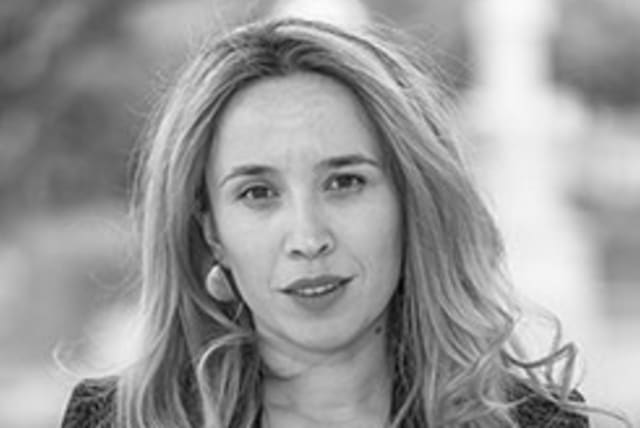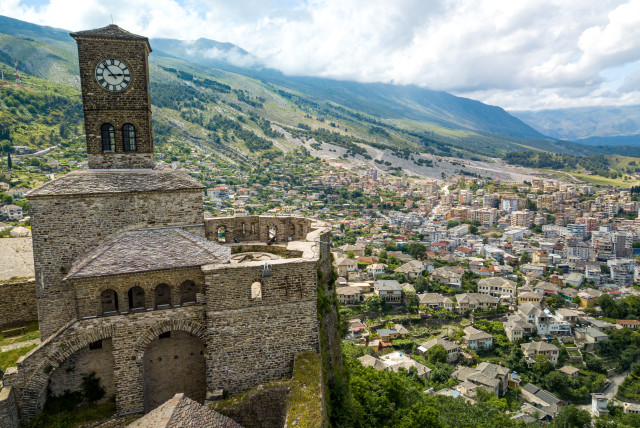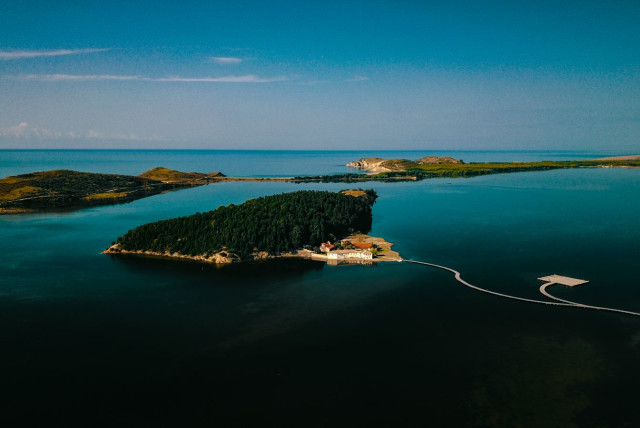Albanian Ambassador to 'Post': ‘We take pride in the saving of the Jews of Albania'

Albania was the only country subjugated to Nazi occupation whose Jewish community emerged from the holocaust in higher numbers in comparison to those before the war.
Thank you very much for joining us, Ambassador Kumbe.
“Thanks for inviting me to share the story of my country, I view it as a great privilege. Not many know that much about Albania, or about the shared history of our countries and people.”
Kumbe arrived in Israel in August, less than two months before the October 7 massacre. This is her first post as ambassador, and prior to that she worked as Deputy Minister of Culture, as well as a university lecturer in the fields of musicology and music science; her Ph.D. encompassing the triangle of relations between music, Church, and state, and how politics use music to create national identities. She is also a UNESCO expert of Intangible Cultural Heritage.
“Albania is a small country, but I believe that we have a lot to bring to the world in terms of our story, which stresses tolerance and coexistence throughout our history, with the story of the Jewish community during WWII being the most well-known of them, though unfortunately not known enough.”
Albania was the only country subjugated to Nazi occupation whose Jewish community emerged from the holocaust in higher numbers in comparison to those before the war, multiplying tenfold from a handful of hundreds to an estimate several thousands. This is due to the commitment of both Albanian authorities and citizens to safeguard the Jewish population, hide them from the Nazis, and refuse to provide information regarding names and addresses of local Jews and Jewish refugees from other countries alike.
How is this moving and inspiring story commemorated in Albanian life?
“The story of the saving of the Jewish community is an important part of our 20th century story, and as such it plays a vital role in the school curriculums in Albania. We are proud of this part of our story, of who we are. The Foreign Affairs Ministry has a yearly activity dedicated to International Holocaust Remembrance Day, and in general, we celebrate the respect between the different communities that make up our country. We make sure to raise kids in the same spirit, and anyone who finishes high school knows about this story.
“Our government is currently promoting two major initiatives in this context. One of them is the first Jewish Museum in the country, in the city of Vlora, with the support of the Albanian American Development Foundation and the Albanian Jewish Community. This museum will be dedicated to the story of the Albanian Jewish community and their inter-religious relations in the country, with the saving from the holocaust a big part of it. Even though I must say that for us it was never about religion; rather, our traditions and set of values made us stand strong and protect life and freedom of our fellow Albanian Jews.
“The second initiative is the Besa museum in the city center of the capital Tirana, which refers to the Albanian code of honor that stands at the basis of the saving of the Jewish community.”
Can you elaborate on Besa?
“Besa means something in the lines of honoring one’s word. When you ask others for their trust, if they say yes – they must honor their word. In modern terms it’s like signing a contract, but it’s much more than that. It’s practically giving your own life for this cause.
“On this background, many Albanian families, mostly Muslims, provided safe asylums for Jewish families. However, this code of honor was not limited to the families themselves but rather extended also to the neighbors, the neighborhood, the village, and even the country. All these circles knew of the families of Jews being hidden in other peoples’ houses and pledged to remain silent. This was a communal code of conduct of giving the word and honoring it. And let’s remember that this happened under Nazi occupation, which was very violent towards Albanians from all religions for not collaborating with them.”
Do you have any personal relation to such stories?
“Personally, I heard many first-hand stories from family friends that protected Jews. These are not just stories I read in publications in the newspaper, but rather people who I know personally and whose families took part in this inspiring turn of events.
“One example I heard from the youngest child in an Albanian family who remembers how he grew up together with a Jewish family during the war. The Jewish family were originally refugees who came from Eastern Europe and arrived in Albania during the war. They were desperate and traveled for months. Upon arriving in Albania, they went up to a house and knocked on the door – there were 12 or 13 people, from the elderly to little children. The father had a jewelry box, which he presented to the homeowner, urging him to take their last belongings and save his family.
“The father took the box to the side, welcomed the family, dressed them in Albanian garb, and they lived there for over 2.5 years. The Albanian family even moved their Jewish guests to their village house in the mountains at one point when things got more dangerous. At the end of that period, the family was preparing to leave, and the Albanian head of the family brought back the jewelry box untouched. Turns out that he hid the box somewhere safe from Nazis and was able to save the family as well as their only belongings. This Jewish family is still in touch with their Albanian saviors, and they even named kids after each other.
“Another story I heard from an Albanian Jewish family I met in Israel, who told me how they were saved. The family lived in the capital, Tirana, and their neighbor urged them to stay with them. They hid there for a while, and one evening, the Jewish father went out for a walk and realized that the situation was worsening; he went back to their hosts’ home and told his family that they must go home because they shouldn’t risk their hosts’ lives, and they went back to their home.
“Several hours later, the Albanian family went back and knocked on the door and urged them to return. They said: ‘We’ll feel guilty for the rest of our lives if something were to happen to you. If we must die – let’s die together.’
“These moving stories and dozens more show the beautiful human aspect of the Albanian people’s soul.”
Albania is a Muslim-majority country. Under the current geopolitical prospects, Muslim communities who would risk their lives to save their Jewish neighbors sound almost dreamlike. What can we learn from the Albanian model here in the Middle East?
"As Pope Francis said during his visit, Albania is a religious brotherhood country. In Albania, religion is considered a private matter between men and God, and we may be quite unique in this aspect. If Albanian kids are asked what they are, they will answer by telling you that they are Albanians first and foremost, without emphasizing their religious background.
“Every religious group in Albania that has a holiday or festive occasion grants a day off to all other people in the country regardless of their religious affiliation. We also celebrate everything together. For instance, when Muslims in the country have their holidays – the entire country has vacation days, and they invite Christians and Jewish friends over to their houses. Christians do the same as well, they invite Muslims, Jewish or Bektashi friends to Christmas or Easter family celebrations. This is usual for us and the way our society works. Hanukkah is another occasion in Albania when everyone lights candles together.
“What unites us is our national identity and the Besa code imprinted in us from time immemorial. Albanian tolerance means that we not only accept each other for who we are but also show respect and understanding and educate for togetherness.
“This is the basis of how the Jewish community came to be an integral part of our society, and this is the reason for which the number of Jews in Albania was larger at the end of the war than it was before.”
What is the situation in Albania today regarding the Jewish community?
“Most Jews left Albania after the fall of communism in 1990. This wasn’t an entirely Jewish movement, as nearly half of the country’s citizens left due to the poor conditions of Albania following decades of communist rule; however, many came back as Albania was stabilized as a democratic and developed country with a solid democracy.
“Nowadays there is an interesting phenomenon of Israelis who come to live in Albania, most not related to the ancient Albanian Jewish community. They live mostly in the cities Vlora and Shkodra. There is also a small community with an active synagogue in Tirana, and ruins of ancient synagogues were also found in the southern part of the country.
“Interestingly, in the north, mostly in the catholic part of it, some hidden Jewish symbols and Hebrew words were found in ceilings of houses, including Stars of David and Menorahs. These buildings are very old, and some of them were designated as a heritage patrimony. The storytelling refers to crypto-Jews living there, but this is not yet scientifically documented.”
How has it been for you to serve during the war? Has it affected Albanian society in terms of views toward Israelis or Jews?
“In terms of the situation in Albania during the war, there were no manifestations of antisemitism in the country whatsoever. During Holocaust Remembrance ceremonies in past decades, Israeli colleagues in Albania reiterated the same point, that there is simply no antisemitism in the country”.
“Even now, after October 7th happened, we saw many Israelis going to Albania. I was in close contact with them, and I was so glad to hear that they were feeling safe and comfortable. During our communication, they shared with me their experience describing Albanian people as very welcoming and friendly, and this is an essential part of our tradition. In Albanian we say: the house of Albanians is the house of God and friends (Shtëpia e shqiptarit është e Zotit dhe e mikut)”.
“The situation now is an immense challenge for Israeli society. Any ambassador in any country can’t really disconnect from the challenges experienced by the country as a whole, and the same goes for me. I see it as a joint journey of our diplomatic mission with Israel, a very challenging one indeed. We hope that hostages come back home as soon as possible the conflict in Gaza comes to an end, and peace prevails in the region.”
What would your messages to our readers be?
“Israel is a wonderful multicultural society, and as an Albanian, I strongly believe in the power of education. Schools are the strongest tool to bring kids together, to know and share the culture and customs of each other, to accept and respect diversity, and to promote tolerance. I strongly believe that this would directly contribute to building peaceful coexistence and a sustainable future. For my part, I even decided to send my son to an Israeli public school as an opportunity to learn more about Israel and its people.
“Customs, traditions, languages, and religion are what shape our soul as humans, and in any case, it shouldn’t be a tool for conflict. Our children in Albania are being taught that, first and foremost, it’s important to be Albanians and to love each other and our country, and then, on top of that – everyone is free to believe what they want. For this reason, offending somebody in Albania for its own customs, traditions, and religion is never socially accepted.
“Tolerance is another strong message that my country can share with the world. When tolerance forms part of the system itself, this brings understanding, acceptance, and sustainability. It’s easiest for humans to get into conflict with other groups, but teaching about tolerance and acceptance, intertwining it as part of the agenda on a state level, can help create the perspective for sustainable development and peace.
“We’re a small country with much to give to the world. We are a secular state, and yet our country recognizes four major official religions, all living in harmony side by side. Our government is also one of the most gender-balanced ones, with ten women ministers out of 17. We boast wonderful landscapes populated by amazing people who have beautiful souls. I invite everyone to visit Albania, not just for tourism, but to see what Albanian life is and who Albanian people are – to get a grasp of what it is about this nation that insisted with its Besa on saving an entire Jewish community, even under the harshest of circumstances.”
Jerusalem Post Store
`; document.getElementById("linkPremium").innerHTML = cont; var divWithLink = document.getElementById("premium-link"); if (divWithLink !== null && divWithLink !== 'undefined') { divWithLink.style.border = "solid 1px #cb0f3e"; divWithLink.style.textAlign = "center"; divWithLink.style.marginBottom = "15px"; divWithLink.style.marginTop = "15px"; divWithLink.style.width = "100%"; divWithLink.style.backgroundColor = "#122952"; divWithLink.style.color = "#ffffff"; divWithLink.style.lineHeight = "1.5"; } } (function (v, i) { });


